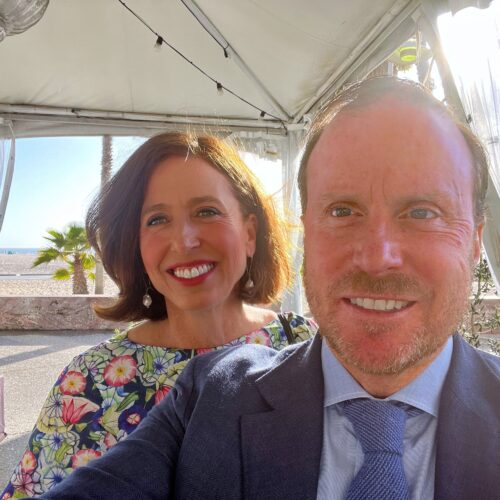When Marcus Kawaja, Class of 2025, began his college search, parents Wendy Holcombe and Carl Kawaja of San Francisco thought WashU might be a good fit.
“It seemed like a great university, and it had a really good feel,” says Wendy. “I had a dear friend from college whose mom worked at WashU. I heard a lot about it through my friend. Then I visited my friend in St. Louis a few times, so I would see the campus—I just thought it was so lovely and everyone seemed very happy there.”
Carl had similar feelings about WashU.
“We have a good family friend who is from the city of St. Louis. I feel like everyone you meet from St. Louis, when you tell them you’re looking at WashU, they want you to go there. They’re all St. Louis believers.”
Touring colleges in fall 2020 proved challenging during the pandemic, but Wendy and Marcus made the trip from San Francisco and were able to take an unofficial walking tour.
“I just felt he needed to see it,” Wendy says. “It was a very quiet campus, but as we left, Marcus said, ‘I am definitely applying early here.’”
Wendy and Carl say Marcus’ first year at WashU has been a wonderful experience for him. “He seemed so intellectually alive,” Wendy says, recalling a visit with Marcus after his first semester. Anthropology and art history have been particularly interesting subjects for Marcus.
“I think he just sort of experimented in the spirit of being in college and took a course in something different,” Carl says. “In his art history class, they looked at some buildings in St. Louis, including in Forest Park, and it kind of helped him engage with the community,” Carl adds.
“We’re looking for ways to create opportunity for others through education, and research that makes the world a better place.”
Wendy Holcombe, WashU parent
As parents, Carl and Wendy have also engaged with the WashU community. “I go to coffees out here in San Francisco,” Wendy says, “I have a new mom friend who also has a first-year student at WashU. I’ve tried to plug into the Northern California WashU world, and I’m happily a booster for WashU out here.”
Carl notes it’s been nice getting to know some of Marcus’ WashU friends as well. “Your kids get older, and their friends are kind of part of your orbit. They’re adults, and they have adult discussions, and that’s enriching.” Wendy and Carl have visited Marcus in St. Louis, enjoying restaurants, the Cardinals, and even a Friday afternoon pickleball game with Marcus and friends.
Through their growing involvement with the university, Wendy and Carl learned of the Chancellor’s Career Fellows Program, and they were happy to provide support. “We love the idea of increasing access to WashU and improving the equity of the student experience,” Carl notes.
The Chancellor’s Career Fellows Program provides a fully-funded career education experience for select second- and third-year students whose family income is less than $75,000, with a goal of increasing career access and future career success for under-resourced WashU students.
Carl and Wendy’s contribution, paid with Bitcoin, was the first gift of cryptocurrency to WashU. “I think there’s a decent chance that more people will make donations in Bitcoin going forward,” says Carl, “partly because so much wealth has been created in the Bitcoin universe.”
Carl notes that some might be apprehensive about giving Bitcoin. “There’s a little more documentation than with a regular donation,” Carl says, “but it’s really quite easy.”
Having made gifts of Bitcoin before, Carl was familiar with the process, and likens it to giving away a piece of art. “Let’s say I gave a Picasso to WashU, not that we have one to give,” he says, “and the painting was deemed to be worth a million dollars. You’d need an art appraiser to say, ‘Yes, if you were to sell this at auction, you would get a million dollars.’ So you technically need an appraisal like that for Bitcoin. But the thing that’s different about Bitcoin is it trades every second of every day.”
Aside from providing valuable support to a charitable organization, Carl notes donating cryptocurrency can have a positive effect for the donor as well. “It’s subject to the usual characteristic that if you give away an appreciated asset, you avoid the capital gain on that asset.” But, he explains, Bitcoin also has a flexibility that differs from stock. “If you gave away Ford Motor stock, and then you bought it back the next day, the government would look askance at that transaction. With Bitcoin, you can give it away and buy it back the next day if you wanted.”
Support of the Chancellor’s Career Fellows Program is one piece of Wendy and Carl’s philanthropic big picture. Public health, health outcomes for disadvantaged members of communities, increased educational access and removing financial impediments so schools can have a more diverse student body are all causes important to Carl and Wendy.
“We’re looking for ways to create opportunity for others through education, and research that makes the world a better place,” Wendy says.
As for acceptance of cryptocurrency, Carl is glad WashU now has a process in place. “I think it’s a promising thing for WashU and for us. Thanks to the work they do, they made it very easy. It’s completely seamless.”
